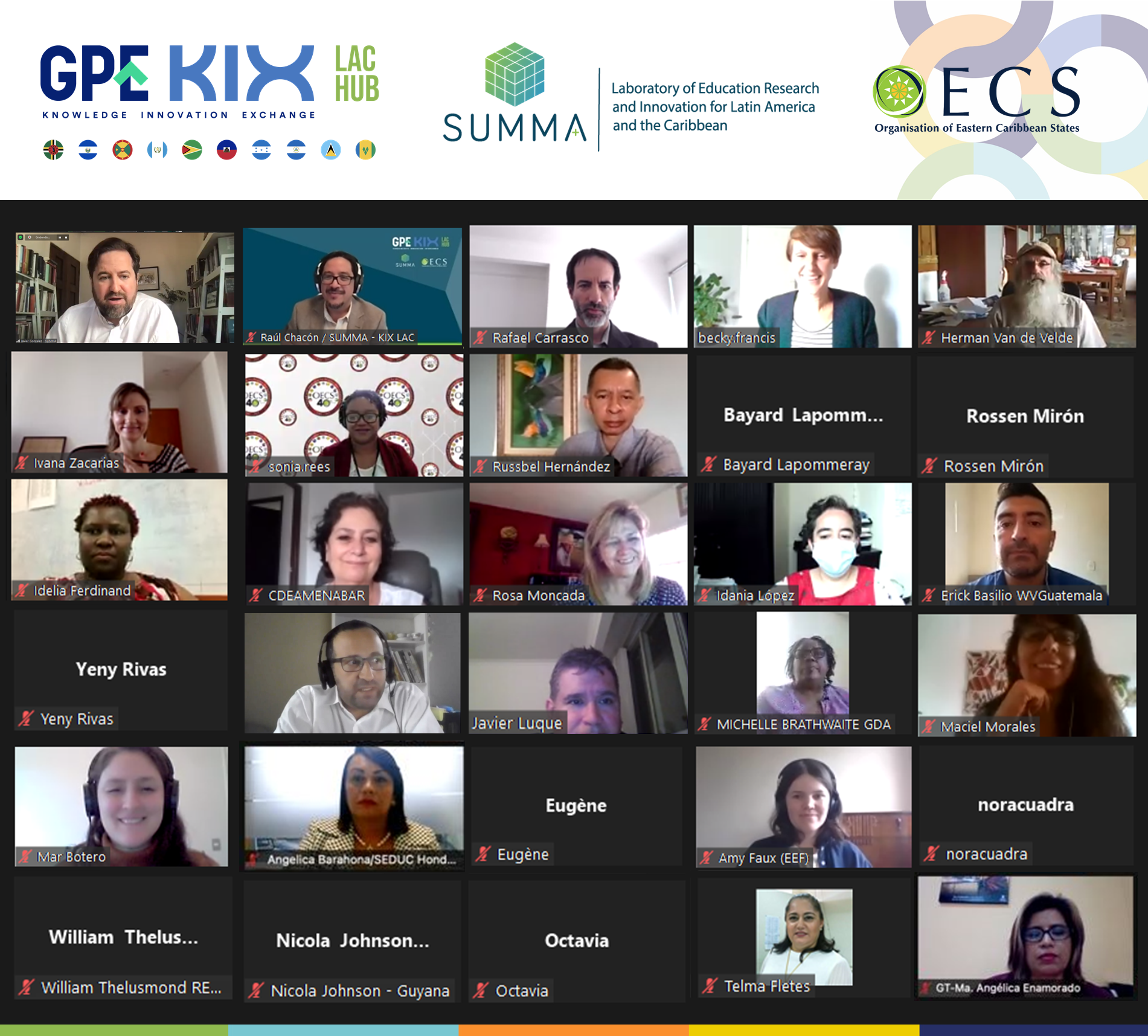COMPARTIR
Meeting of international experts on the use of educational evidence in times of pandemics
August 4, 2021
SUMMA and OECS, through the KIX LAC Center, organized the webinar “Use of Evidence in Times of [Post] COVID: Educational Tools and Experiences” where education specialists presented various platforms and actions applied in some educational systems, derived from the experiences left by the COVID-19 pandemic worldwide, and especially in Latin American and Caribbean countries.
This meeting brought together Dr. Becky Francis, CEO of the Education Endowment Foundation – EEF -; Dr. Russbel Hernández, Director of the Institute for Educational and Social Research and Evaluation of the National Pedagogical University Francisco Morazán of Honduras; and Dr. Rafael Carrasco, Deputy Director of SUMMA and member of the Board of Directors of the National Agency for the Quality of Education of Chile. The event was moderated by Ms. Sonia Rees, responsible for information management at the Organization of Eastern Caribbean States – OECS.
Javier Gonzalez, Director of SUMMA, welcomed the participants and reflected on the lessons that the pandemic continues to teach us, “Education is a global challenge and we have learned that information and collaboration are the key. We need evidence and information that synthesizes what we know and what are the pedagogical practices that really achieve effective change. He also assured that “We need instances of meeting and innovation mechanisms, enabling spaces to meet and develop routes and strategies for improvement, this is what KIX LAC does”.
Dr. Francis then presented the work carried out by the EEF on the impact of school closures, especially for the most disadvantaged students and assured that “evidence-based learning can bring education closer to the professional practice of teachers and the educational methods used”.
In this sense, he emphasized that “It is not enough to say that there is evidence, but work is needed to translate that evidence into terms that are useful for decision-makers, adapted to the context and reality. To be useful, evidence needs to be adapted to the local reality and this is only possible with the involvement of local researchers who understand the regional dynamics and ensure persistence over time”.
To conclude her presentation, Dr. Francis listed some reflections on the growing interest in the use of evidence worldwide:
High-quality teaching is the most powerful tool we have.
High-quality resources and support must be made available to the students who need it most.
A sustained response over time is essential.
Urgent collaboration is needed locally and globally.
Dr. Carrasco then presented SUMMA’s ongoing work on connecting global learning with local practice, commenting that “We ask ourselves all the time what have we achieved and where can we go from here, how are we doing relative to others, how do we connect global learning with local challenges?” In response to this, he presented SUMMA’s work model, which consists of investigating gaps and critical knots, synthesizing and mapping, innovating in concrete spaces and including in networks.
He also concluded the main measures of action to be taken into account in times of COVID and post pandemic:
Greater investment with focus
Pedagogical and curricular adaptations
Need for teacher training.
Infrastructure: connectivity and technology
Strengthening of alliances and articulations
Monitoring and evaluation.
Dr. Hernández said that “the dissemination of evidence is always a great challenge for universities and some civil society organizations, and the Universidad Pedagógica Nacional Francisco Morazán (UPNFM) has been strengthening its role in this regard so that decision makers in the education sector can design policies at the macro, meso or micro level. The synergy between information providers and decision makers has increased in recent years, but there is still more to be done for educational policies to be designed in a scientifically informed manner”. In reference to this, he indicated that evidence of learning can be obtained from instances of individual and/or group work of the students, situations of hetero-evaluation by the teacher, situations of mutual co-evaluation among peers, or situations of self-evaluation.
At the end of the meeting, Florencio Ceballos, Knowledge Innovation Exchange KIX program specialist at IDRC, and Javier Luque, Country Lead at the Global Partnership for Education (GPE), thanked the attendees for their active participation and confirmed the support of their organizations to continue working on the development of scientific evidence that contributes to the development of effective practices in the countries of the central and southern part of the continent.
Representatives from the KIX LAC countries were also present: Octavia Timothy (Dominica); Yeni Rivas (El Salvador); Michelle Brathwaite and Judy-Ann Auld (Grenada); Rosen Mirón, Erik Basilio, Idania López, Angelica Morales Enamorado and Maria Amalia Cujcuy (Guatemala); Nicola Warinna Johnson (Guyana); Bayar Lapommeray, Itazienne Eugene and William Thelusmond (Haiti); Idelia Ferdinand (St. Vincent and the Grenadines); and Nora Cuadra and Herman Van de Velde (Nicaragua); the project researchers Ivana Zacarias and Maciel Morales; Mar Botero, KIX LAC Community Management Coordinator; and Amy Faux of EEF.
